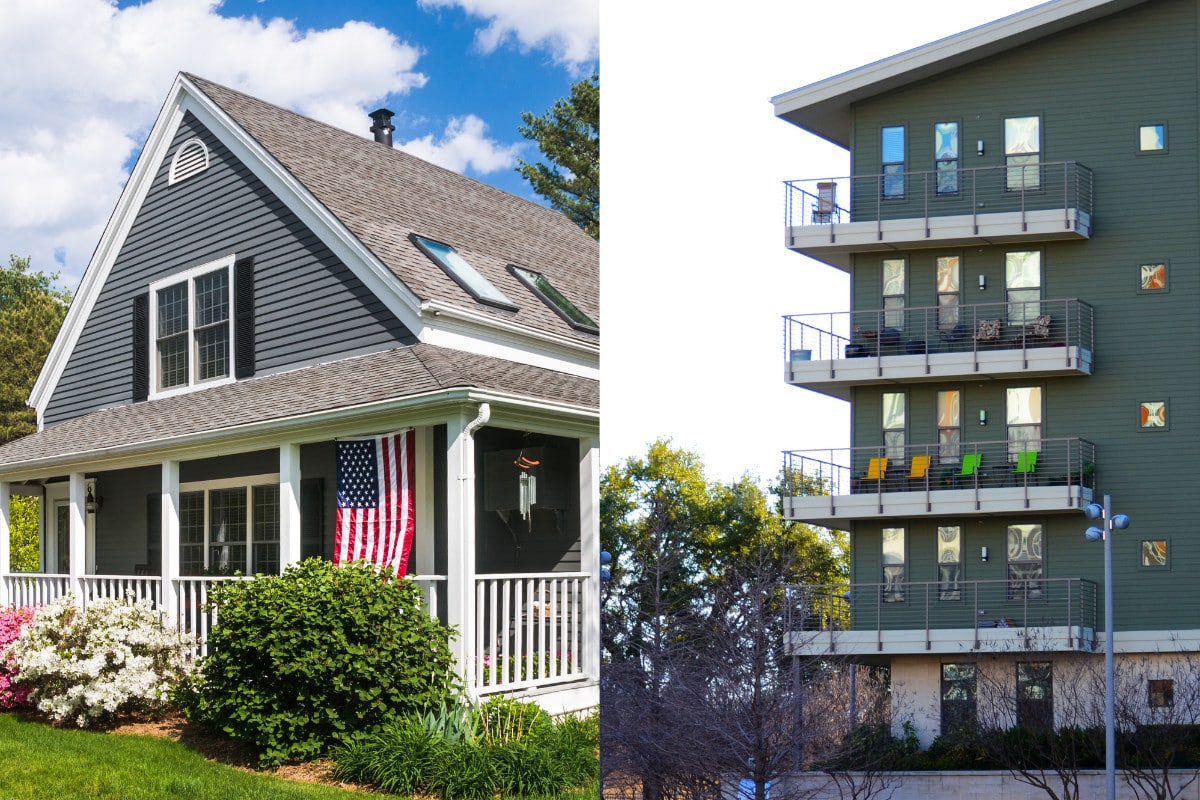Are you currently considering whether a condominium or a single-family home would be the most suitable option for your lifestyle as a prospective first-time homebuyer?
One of the most common decisions homebuyers face is choosing between a condominium (condo) and a single-family home. Both options have distinct advantages and lifestyle implications that should be carefully considered. This article will delve into the key differences between condos and single-family homes (condo vs. single-family home), shedding light on how each choice impacts lifestyle.
Condo vs. Single-Family: Price
Condos are typically less expensive than single-family homes to buy and maintain, but luxury condominiums in large cities can be costly. Condos are an attractive option for first-time buyers or those looking to live in prime urban areas with steep housing prices.
Luxury condos often have high-end amenities, i.e., swimming pools, gyms, and elevators, so condo fees could be expensive. While monthly fees for a modest condo in the suburbs might cost less than $300, many high-end condominium buildings in urban areas have monthly fees surpassing $1,000 a month. These condos are often located in the heart of cities, providing easy access to amenities, entertainment, and work. Regardless of property type, prospective home buyers should consider all costs related to homeownership.
Condo vs. Single-Family: Privacy
Single-family homes offer more privacy than condos in most settings. Single-family houses rarely share walls or other common areas with neighbors. Privacy is essential for families with young children or pets. Many people value their personal space. While condos offer a sense of community, they can also be more densely populated, leading to reduced privacy compared to single-family homes. The living space is usually more compact, which may not be suitable for families with children or home buyers seeking a larger footprint.
Condo vs. Single-Family: Maintenance
Single-family homes require more maintenance than condominiums. You will be responsible for the upkeep of the exterior of your home, as well as any repairs or renovations that need to be made. One of the primary advantages of condo living is the reduced maintenance responsibilities. A condo association typically handles exterior maintenance, landscaping, and common area upkeep, freeing up time for residents to focus on other pursuits. The downside is that condominium owners have less control over maintaining their property.
Condo vs. Single-Family: Flexibility
Single-family homes offer more flexibility for homeowners to create their preferred living space than condo owners. Typically, you can make any changes to your house unless the property is in a HOA, limiting the color options for houses, front doors, and more. For condominiums, restrictions will affect your ability to customize and update the exterior and possibly the unit’s interior space. Remember, a condominium owner typically owns the condo’s interior and the exterior walls’ structural components.
Condo vs. Single-Family: Amenities
Some condominium complexes or buildings have amenities that single-family homes lack, such as swimming pools, gyms, elevators, parking garages, concierge services, etc. These luxurious amenities are a significant perk and offer a sense of community and convenience that may not be as readily available in single-family homes.
Condo vs. Single-Family: Investment Potential
Single-family homes generally have a higher investment potential than condominiums. The investment potential will depend on location, condition, amenities, price, and other factors. An exclusive buyer agent can guide you through the process and help you evaluate future resale. When purchasing a condominium as an investment property, it’s essential to know the limitations set by the condo association for renting out units.
Condo vs. Single-Family: Mortgage Options
First-time homebuyers may have more mortgage options for single-family homes than condominiums because single-family homes are considered a more traditional investment. Certain loan types will have more lending restrictions for condos. Lenders typically require the condo association to complete a comprehensive “condo questionnaire.”
Ultimately, the choice between a single-family home or a condominium is deeply personal, influenced by lifestyle preferences, financial considerations, and long-term goals. An exclusive buyer’s agent will guide you through the decision-making process, providing the information you need to make an informed choice.
By understanding the distinct advantages and lifestyle implications of condos and single-family homes, prospective buyers can confidently begin their journey toward finding the perfect place to call home.
A condo may be a good fit if you want a more affordable option with less maintenance and more amenities. A single-family home may be a better choice if you value privacy and flexibility.
A home buyer should also consider their budget, current market conditions, potential family size, and future plans.
Do your research and talk with a real estate buyer agent about questions you should ask before buying a condominium.
____
VICTORIA RAY HENDERSON is a NAEBA member, a licensed Realtor® and exclusive buyer broker in Maryland, Virginia, and Washington DC, and the owner & broker of HOMEBUYER BROKERAGE. Victoria also hosts and produces NAEBA’s LISTEN UP HOME BUYERS podcast.
RICH ROSA co-founded BUYERS BROKERS ONLY, LLC, a real estate brokerage protecting home-buying consumers in Massachusetts, New Hampshire, and Rhode Island.

